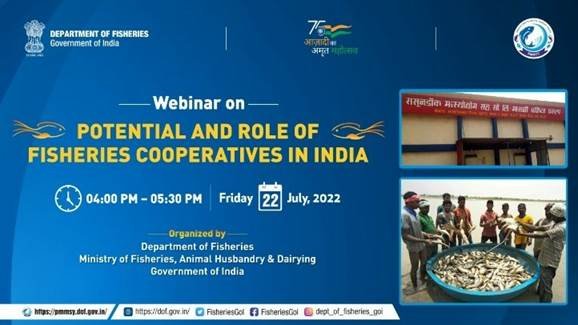Ministry of FAHD hosts webinar on “Potential & Role of Fisheries Cooperatives
The webinar was intended to open a forum to initiate a dialogue about the crucial role of fisheries cooperatives in bringing out prosperity in the lives of fish farmers.
The Department of Fisheries (DoF), Ministry of Fisheries, Animal husbandry & Dairying, organized a webinar on “Potential & Role of Fisheries Cooperatives”. This was the 14th webinar organized by the department in an effort to celebrate the ongoing Azadi Ka Amrit Mahotsav, marking 75 years of India’s independence.
The event was presided over by Jatindra Nath Swain, Secretary, Department of Fisheries (DoF), Government of India (GOI) along with Sagar Mehra, Joint Secretary (Inland Fisheries), Dr J Balaji, Joint Secretary (Marine Fisheries) along with other officials of the Department. This webinar was intended to open a forum to initiate a dialogue about the crucial role of fisheries cooperatives in bringing out prosperity in the lives of fish farmers, leading towards holistic sectoral development.
More than 100 participants including expert panellists, fishers, farmers, entrepreneurs, members of fisheries cooperative societies, fisheries officials of different States/UTs, faculties from State Agriculture, Veterinary and Fisheries universities, Fisheries cooperative officers, Scientists, students and other stakeholders from the fisheries value-chain across the country attended the webinar.
Jatindra Nath Swain, Secretary, Fisheries said, “With the increased production and productivity in the Indian fisheries sector, the Government has been focusing more on establishing cooperatives to enable small-scale fishers to avail support for institutional credit, quality inputs, transportation, logistic etc. through collectivization”.
Sagar Mehra shared his views on the significance of institutionalizing fisheries cooperatives in India. He also mentioned that fisheries being a sunrise sector, there is a need to learn from the best practices from the dairy, agriculture industries and try to use the learnings for developing cooperatives in the fisheries sector.
Sandeep Kumar Nayak, Director General, NCP; Dr. K.P. Rajan, Director, DNS Regional Institute of Cooperative Management, Patna; Dr. S. Noorjahan Beevi, Additional Director of Fisheries, Tamil Nadu and Mr. Anil Rana, Board of Director, AgriOrganic Producer Company Ltd, Una, HP shared their valuable thoughts during the expert panel sessions. Towards the end, the forum was open for interactive discussion with a wide range of questions and answers from all participants.
The webinar was intended to open a







